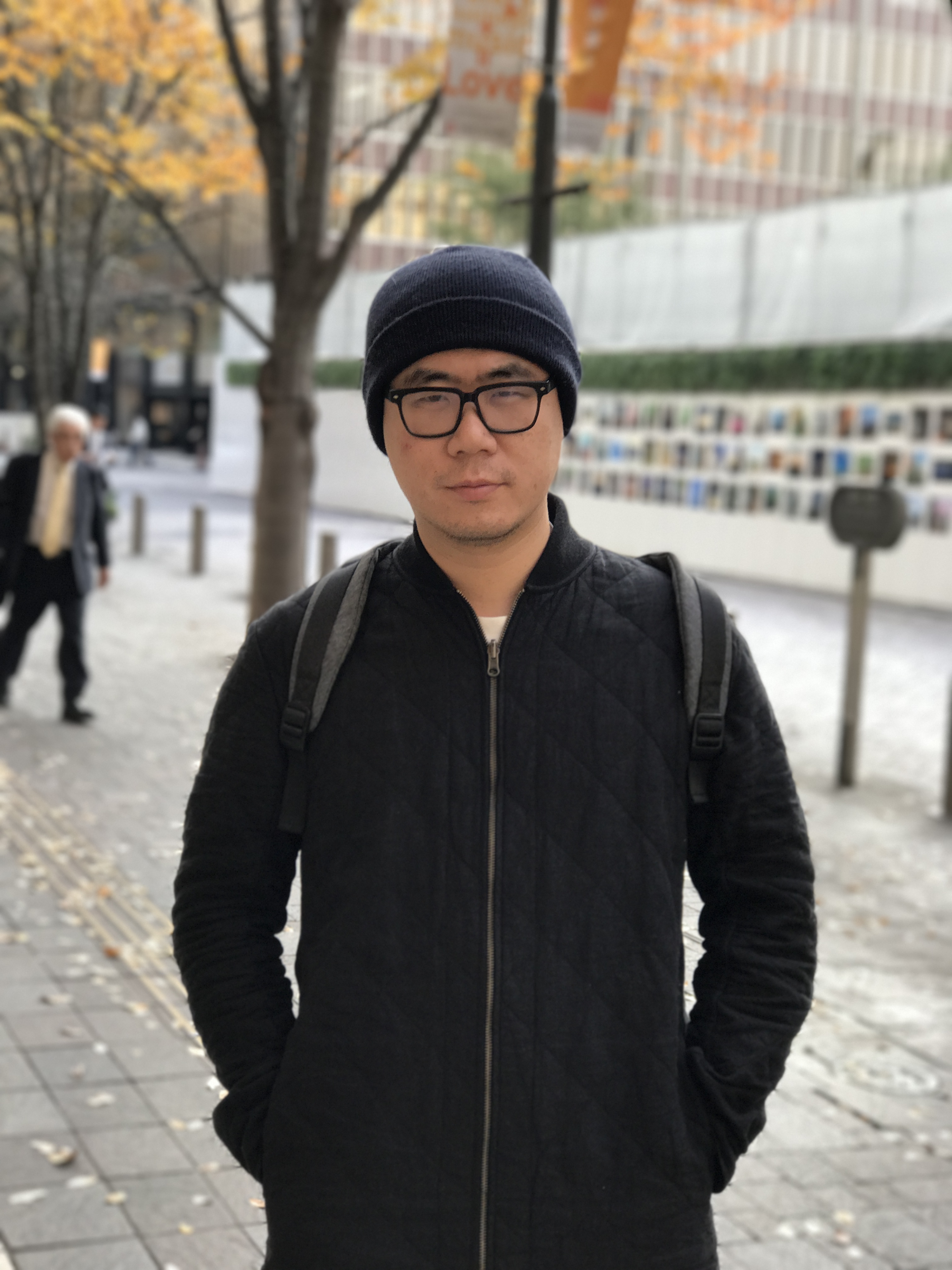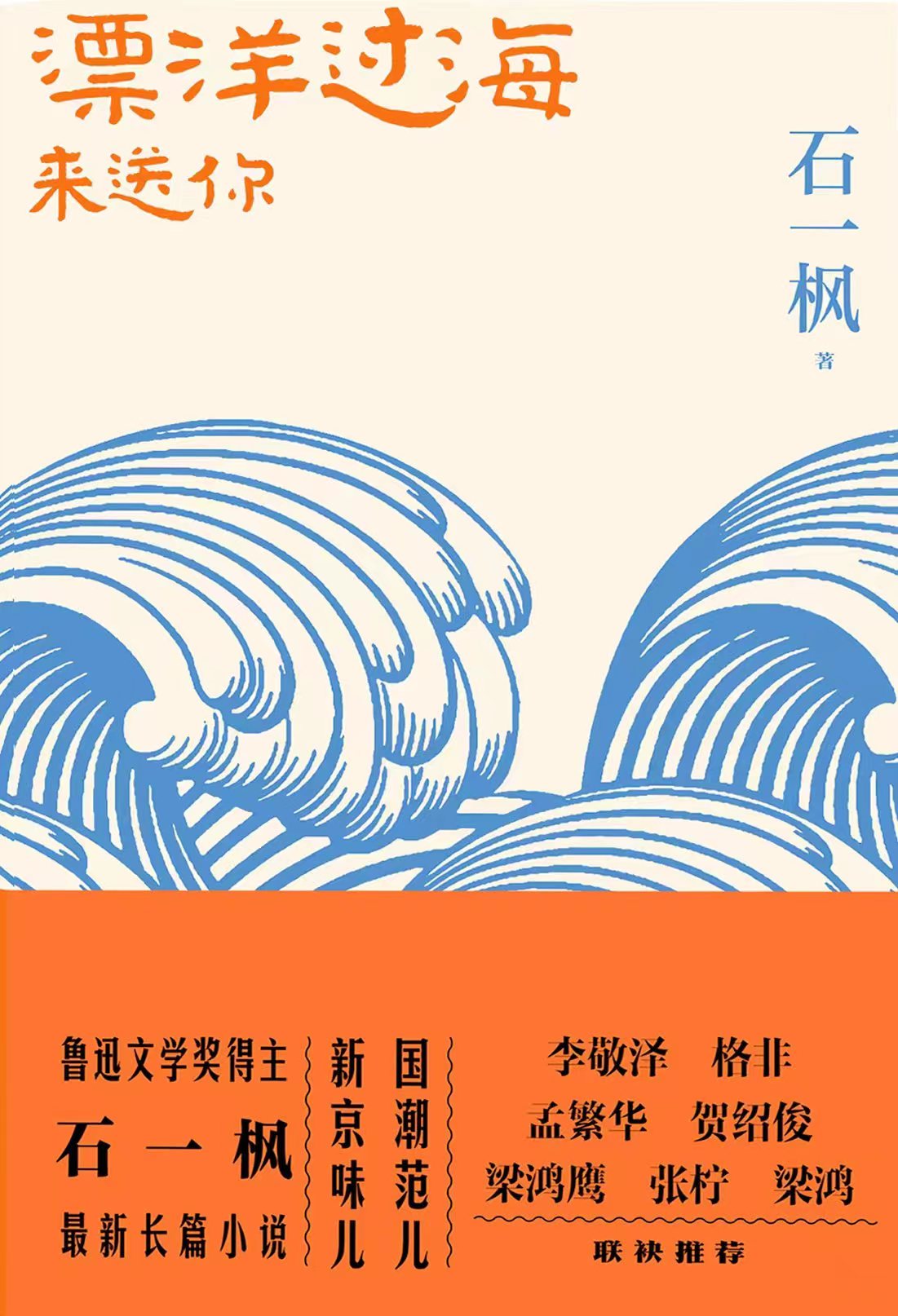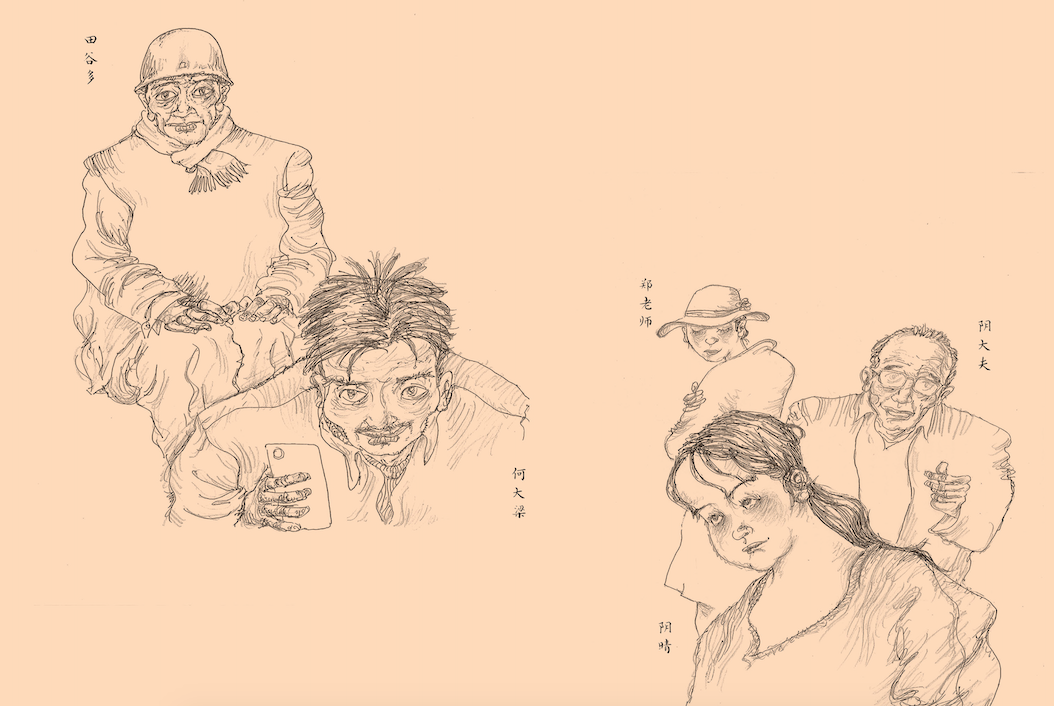
"Can my grandfather's ashes make a sound?" Nadou's grandfather died suddenly, but Nadou accidentally discovered that shaking his grandfather's urn could make a sound. "Chuck, cluck, cluck..." There seemed to be a "foreign object" in the urn that didn't belong to Grandpa. what is this? Why is it here?
In the novel "Across the Ocean to Send You", the protagonist Nadou took this question-filled urn and embarked on a fantastic journey across time and space.
"Across the Ocean to Send You" is the latest novel by writer Shi Yifeng. Recently, the People's Literature Publishing House held an online launch ceremony for the book. Li Jingze, the critic and vice chairman of the Chinese Writers Association, Li Er, the writer, Shi Hang, the book critic, Ji Yaya, the deputy editor-in-chief of "October" magazine, and the author Shi Yifeng shared.
In "Crossing the Ocean to Send You", Shi Yifeng first touched the "aboriginal" in Beijing's hutongs - Nadou and his grandfather since childhood, living in a hutong bungalow. The two and a half small bungalows in the hutong, and the starling oriole hanging at the door of the bungalow constitute the keynote of "Crossing the Ocean to Send You". In the text that follows, the author explores the experiences of the two generations of grandfathers and grandchildren, and reflects the historical changes that have lasted for half a century, from the grandfather's generation of defending the home and the country, the transformation of the factory, to the grandchildren's crossing the sea, Several generations lived distinct but mutually supportive lives.

Whether in reality or in literature, "Beijing" has always been Shi Yifeng's label, and the "new Beijing flavor" in "Across the Ocean to Send You", in Shi Hang's view, is the trace of survival recorded by time itself . "Grandpa's soy sauce factory in the novel, the site of the soy sauce factory later became an international financial center."
Li Jingze believes that Beijing is actually a highly promiscuous and highly immigrant city, "We don't know for sure whether this place must have such a fixed nature, which is called the Beijing nature of literature, or the local literature nature of Beijing. Talking about the taste of Beijing - maybe there is, I can't say no - but it really shapes the character of Beijing fundamentally, or if it has the character of Beijing, it is first of all its cosmopolitan character and global character. For "Send You", what I am really interested in is not the so-called Beijing flavor, what I am interested in is that the world is what is particularly interesting in this novel."
In the sharing, the word "cosmopolitan" was also mentioned many times. "I like Shi Yifeng's cosmopolitan vision in his writing. When I read "Across the Ocean to Send You", I often think of novels like Dickens. Sometimes he also writes about a village, an English It's a village thing, a low-class London neighborhood, but after reading the whole novel, you must feel that what he wrote is something of a world." Li Jingze said.
"The common nostalgia is the world," Shi Hang said. "Like Nadou, he doesn't know whether he cares about Beijing or not. He will remember it when he gets to Chicago."
Heartless idle pen in written language
Regarding Shi Yifeng's language, Li Er believes, "Shi Yifeng can combine spoken language and written language to write, because it is a third-person narration, when he tells a story, he must break away from it to analyze the story, analyze the psychology of the characters, and when When he analyzes the psychology of characters, he is also a combination of written language, Mandarin Chinese and spoken Beijing language."
"When Shi Yifeng wrote a novel, it was different from Lao She. Lao She wrote it close to the characters, and Shi Yifeng was separated from the characters. You have to examine him. Your language is not Beijing dialect plus Mandarin, but a kind of reformation of Beijing style. "Li Er said.
Shi Hang believes that Shi Yifeng's sensibility lies in his more leisurely portrayal, "For example, Nadou opened the manager's head, but his father, who was not in shape, made three cuts, and joked: "The blood is pouring out. Squirt, this is a whale. When ordinary people encounter such a thing, they either care about the injured person or their son. He doesn't care about the two. He cares about the whale. This kind of heartless idle pen is precisely the Beijinger. way of speaking."
In the novel, Nadou's description of his grandfather's memory well reflects the characteristics of Shi Yifeng's language:
"Just like what you said, what I said, and what mynah said, the sun also changed from red to white, illuminating the mist above the roundabout, and illuminating the abundant traffic flow under the overpass in the distance. After a while, the traffic flow gradually stopped again. This place began to be crowded for more than ten hours a day. The subway stations around the island were also crowded, and sometimes Nadou thought, looking at these people's turbulent posture, it really shows that he is like the news He said, living in a big country. And this scene also showed that the time was almost up, so he stood up and said to his grandfather: 'Then you rest, I'll go to work.' The grandfather said: 'Little monkey' Brat, kneel down.'"
Li Jingze said, "In our memory, a grandfather and a grandson are not ordinary emotions, but truly two complete lives, and novels that are also driven by a world outlook and values are rare."
"After the protagonist's grandpa died, his ashes became a 'non-existent existence', and his ashes could even be used as the first character. He died very soon at the beginning, but all stories are because of his ashes, and In the ashes, the various cultural atmospheres he carried before his life, his traditions, his old manners, and his face, constitute the core of this novel." Li Er said.
In an interview with "October", Shi Yifeng talked about the conception process of "Across the Ocean to See You": "I like to see some old seniors have their own set of words and love to talk about the world as their village's. It's about a climate deal or a trade war. It's about an adultery on the threshing floor, or the stupid second uncle who lost two chickens. Eat the bowl and watch the pot with the world in mind. But for people my age In other words, there is also a subconscious, that is, our life has already been encompassed by the entire earth, whether you like it or not, there is no sense of distance between eating a bowl and watching a pot. This kind of encumbrance sometimes makes us hallucinate and ascend to the world. At the top, sometimes it makes us lick the wound with self-pity, and we also need to present its process and mechanism.”
With this kind of thinking, although the novel "Across the Ocean to Send You" is based on humor, it also contains a kind of solemnity, as written in the book:
"Being knocked out of his head, Dou wakes up like a dream, and it seems like a lifetime. It was like this when he was a child, and it is the same now: when he was shocked, he first had to re-determine his position in the world, and after a while, He seemed to remember that his grandfather had passed away, and he was going to the cemetery to send him off. He still remembered that he had just thought of sadness and nothingness, and thought of things like smoke. With another flash of his mind, he saw that there was a real thing in front of him. The smoke—the smoke was gray, thick and vast, rolling over and over the windows."
Shi Yifeng believes, "The interesting thing about talking about things is that things that are extremely distant are related, and they are related to each other." The new generation of young people are looking at and contacting the outside world in a different way from their predecessors: In the mobile phone video, on the other side of the unfamiliar ocean, heterogeneous cultures collide with each other. Carrying a bird in a cage and crossing the ocean are an aspect of reality.
In the novel "Across the Ocean to Send You", the protagonist Nadou took this question-filled urn and embarked on a fantastic journey across time and space.
"Across the Ocean to Send You" is the latest novel by writer Shi Yifeng. Recently, the People's Literature Publishing House held an online launch ceremony for the book. Li Jingze, the critic and vice chairman of the Chinese Writers Association, Li Er, the writer, Shi Hang, the book critic, Ji Yaya, the deputy editor-in-chief of "October" magazine, and the author Shi Yifeng shared.

sharing session
"Taste of Beijing" and "common nostalgia"In "Crossing the Ocean to Send You", Shi Yifeng first touched the "aboriginal" in Beijing's hutongs - Nadou and his grandfather since childhood, living in a hutong bungalow. The two and a half small bungalows in the hutong, and the starling oriole hanging at the door of the bungalow constitute the keynote of "Crossing the Ocean to Send You". In the text that follows, the author explores the experiences of the two generations of grandfathers and grandchildren, and reflects the historical changes that have lasted for half a century, from the grandfather's generation of defending the home and the country, the transformation of the factory, to the grandchildren's crossing the sea, Several generations lived distinct but mutually supportive lives.

Shi Yifeng
The opening chapter of "Across the Ocean to Send You" wrote: (Nadou) After working in the hotel, as long as there is no night shift the day before, he will accompany his grandpa to walk the birds. In the early morning of winter, the sun was still red, and there was still a mist in the alley, so the two of them went out. There were almost no cars on the street at this time, and the air was exceptionally fresh. Grandpa walked in front, with a cage of oriole in his left hand and a cage of myna in his right. The bean followed behind, wearing the uniform of the doorman issued by the hotel, looking like a little valet. Grandpa does have a style, too. He has a big, half-grey, half-white back, with his arms on both sides, and his thin and tall frame can't wait to take up half the alley. The grandson in the house guides the way.
"Across the Ocean to Send You"
"When I read this novel, I was very impressed by its Beijing flavor." Ji Yaya said, "When I opened it, there was a starling in it. It was a talking starling, and he could talk. The author arranged for his protagonist. When I came out, the first detail was to pick up the cage bird and walk around the island inward."Whether in reality or in literature, "Beijing" has always been Shi Yifeng's label, and the "new Beijing flavor" in "Across the Ocean to Send You", in Shi Hang's view, is the trace of survival recorded by time itself . "Grandpa's soy sauce factory in the novel, the site of the soy sauce factory later became an international financial center."
Li Jingze believes that Beijing is actually a highly promiscuous and highly immigrant city, "We don't know for sure whether this place must have such a fixed nature, which is called the Beijing nature of literature, or the local literature nature of Beijing. Talking about the taste of Beijing - maybe there is, I can't say no - but it really shapes the character of Beijing fundamentally, or if it has the character of Beijing, it is first of all its cosmopolitan character and global character. For "Send You", what I am really interested in is not the so-called Beijing flavor, what I am interested in is that the world is what is particularly interesting in this novel."
In the sharing, the word "cosmopolitan" was also mentioned many times. "I like Shi Yifeng's cosmopolitan vision in his writing. When I read "Across the Ocean to Send You", I often think of novels like Dickens. Sometimes he also writes about a village, an English It's a village thing, a low-class London neighborhood, but after reading the whole novel, you must feel that what he wrote is something of a world." Li Jingze said.
"The common nostalgia is the world," Shi Hang said. "Like Nadou, he doesn't know whether he cares about Beijing or not. He will remember it when he gets to Chicago."
Heartless idle pen in written language
Regarding Shi Yifeng's language, Li Er believes, "Shi Yifeng can combine spoken language and written language to write, because it is a third-person narration, when he tells a story, he must break away from it to analyze the story, analyze the psychology of the characters, and when When he analyzes the psychology of characters, he is also a combination of written language, Mandarin Chinese and spoken Beijing language."
"When Shi Yifeng wrote a novel, it was different from Lao She. Lao She wrote it close to the characters, and Shi Yifeng was separated from the characters. You have to examine him. Your language is not Beijing dialect plus Mandarin, but a kind of reformation of Beijing style. "Li Er said.
Shi Hang believes that Shi Yifeng's sensibility lies in his more leisurely portrayal, "For example, Nadou opened the manager's head, but his father, who was not in shape, made three cuts, and joked: "The blood is pouring out. Squirt, this is a whale. When ordinary people encounter such a thing, they either care about the injured person or their son. He doesn't care about the two. He cares about the whale. This kind of heartless idle pen is precisely the Beijinger. way of speaking."
In the novel, Nadou's description of his grandfather's memory well reflects the characteristics of Shi Yifeng's language:
"Just like what you said, what I said, and what mynah said, the sun also changed from red to white, illuminating the mist above the roundabout, and illuminating the abundant traffic flow under the overpass in the distance. After a while, the traffic flow gradually stopped again. This place began to be crowded for more than ten hours a day. The subway stations around the island were also crowded, and sometimes Nadou thought, looking at these people's turbulent posture, it really shows that he is like the news He said, living in a big country. And this scene also showed that the time was almost up, so he stood up and said to his grandfather: 'Then you rest, I'll go to work.' The grandfather said: 'Little monkey' Brat, kneel down.'"

hand drawn illustration
Life has already been engulfed by the whole earthLi Jingze said, "In our memory, a grandfather and a grandson are not ordinary emotions, but truly two complete lives, and novels that are also driven by a world outlook and values are rare."
"After the protagonist's grandpa died, his ashes became a 'non-existent existence', and his ashes could even be used as the first character. He died very soon at the beginning, but all stories are because of his ashes, and In the ashes, the various cultural atmospheres he carried before his life, his traditions, his old manners, and his face, constitute the core of this novel." Li Er said.
In an interview with "October", Shi Yifeng talked about the conception process of "Across the Ocean to See You": "I like to see some old seniors have their own set of words and love to talk about the world as their village's. It's about a climate deal or a trade war. It's about an adultery on the threshing floor, or the stupid second uncle who lost two chickens. Eat the bowl and watch the pot with the world in mind. But for people my age In other words, there is also a subconscious, that is, our life has already been encompassed by the entire earth, whether you like it or not, there is no sense of distance between eating a bowl and watching a pot. This kind of encumbrance sometimes makes us hallucinate and ascend to the world. At the top, sometimes it makes us lick the wound with self-pity, and we also need to present its process and mechanism.”
With this kind of thinking, although the novel "Across the Ocean to Send You" is based on humor, it also contains a kind of solemnity, as written in the book:
"Being knocked out of his head, Dou wakes up like a dream, and it seems like a lifetime. It was like this when he was a child, and it is the same now: when he was shocked, he first had to re-determine his position in the world, and after a while, He seemed to remember that his grandfather had passed away, and he was going to the cemetery to send him off. He still remembered that he had just thought of sadness and nothingness, and thought of things like smoke. With another flash of his mind, he saw that there was a real thing in front of him. The smoke—the smoke was gray, thick and vast, rolling over and over the windows."
Shi Yifeng believes, "The interesting thing about talking about things is that things that are extremely distant are related, and they are related to each other." The new generation of young people are looking at and contacting the outside world in a different way from their predecessors: In the mobile phone video, on the other side of the unfamiliar ocean, heterogeneous cultures collide with each other. Carrying a bird in a cage and crossing the ocean are an aspect of reality.
Related Posts